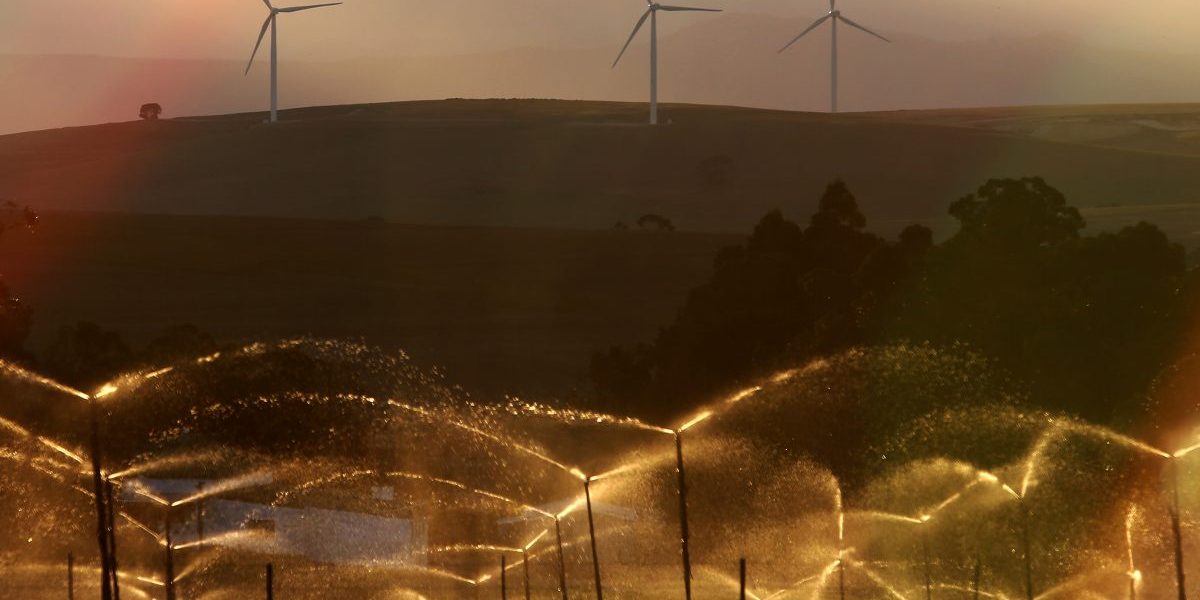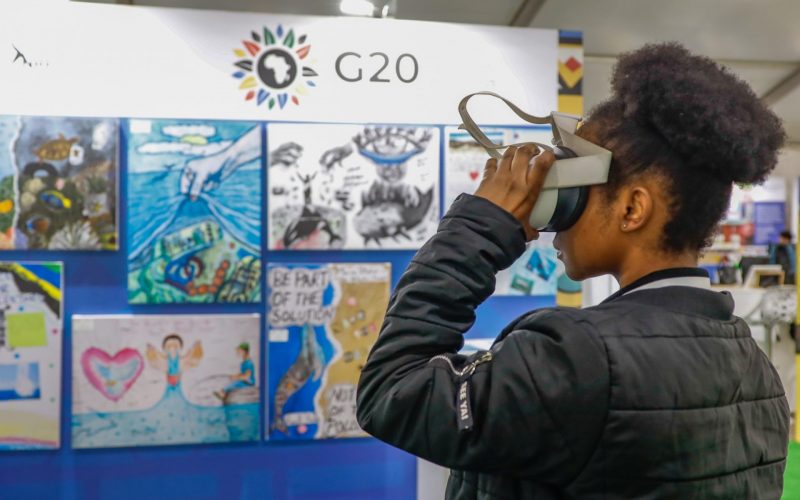Recommendations
- Given the current political shifts taking place globally, as well as the impact of the novel coronavirus (COVID-19) on the global economic and political system, achieving meaningful reductions in global greenhouse gas emissions seems increasingly unlikely. South Africa should therefore, as a matter of urgency, prioritise strengthening adaptive capacity and building resilience at the domestic and regional level.
- While South Africa should not abandon the UN Framework Convention on Climate Change, it should, in the short term, focus its efforts on leveraging its soft power influence to drive an adaptation and resilience agenda at other fora, such as the Forum on China–Africa Cooperation and the upcoming EU–AU Summit.
- Africa’s relative geo-political importance, particularly in the context of escalating US–China tensions, provides President Cyril Ramaphosa, as current chair of the AU, with an opportunity to spearhead a ‘green’ recovery agenda in the COVID-19 recovery packages.
Introduction
COVID-19, which first surfaced in Wuhan, China, in December 2019 and reached pandemic proportions by early 2020 has added an additional layer of complexity to an increasingly uncertain global landscape. The pandemic comes at a time when shifts in the global political system were already beginning to surface. While the full impact of COVID-19 on global politics is yet to be seen, what is clear, is that as we move forward, uncertainty will become the new normal, at least in the short term. This policy brief seeks to understand how, given this uncertainty, South Africa should pursue its climate change objectives at both the domestic and international level and indeed what these objectives should be.
South Africa’s climate change diplomacy to date
South Africa’s position on climate change at the international level has, in essence, been the following: climate change poses a serious risk to the developing world; developed countries should be held responsible for their contribution to climate change; developing countries should be given some carbon space with which to pursue their development objectives; and the developed world needs to provide support (financial, technical and capacity building) to the developing world for them to be able to adapt and mitigate.
This position must be understood in the context of the difficulties that South Africa faces domestically. In addition to having to tackle complex socio-economic challenges, such as growing levels of unemployment, poverty and inequality, South Africa also faces the very difficult and pressing task of transitioning the economy away from what Ben Fine and Zav Rustomjee termed the Mineral-Energy Complex.1Ben Fine and Zavareh Rustomjee, The Political Economy of South Africa: From Minerals-Energy Complex to Industrialisation (London: C. Hurst & Co., 1996)Given the extent of South Africa’s dependence on coal, transitioning to cleaner technologies involves difficult trade-offs, at least in the short term. Not surprisingly then, very few politicians or political parties – whose positions of power depend on re-election – have been willing to take up this challenge. Furthermore, there are powerful class interests that have and continue to benefit from maintaining the status quo.
Given these domestic realities, South Africa is in a relatively unique position in international climate change negotiations. On the one hand, South Africa, like other developing countries is at far greater risk from climate change impacts and is far less cushioned than developed countries to absorb these impacts. On the other hand, South Africa, unlike many developing countries is a high emitter, thereby contributing to climate change.
While South Africa is recognised as a strong voice in climate change negotiations, it is certainly not the most powerful country. As such, South Africa has had a difficult balancing act to play in protecting its interests. Its approach, which has mirrored its international diplomacy more generally, has been to develop and tap into strategic alliances that support its different interests. To this end, South Africa is a member of three important negotiating blocs at the Conference of the Parties (COP), namely the G77/China, the BASIC (Brazil, South Africa, India and China) and the African Group of Negotiators.
The BASIC bloc has arguably been South Africa’s most important alliance because it has played a critical role in warding off attempts by both the developed and developing world to force high-emitting developing countries to reduce their emissions. However, given recent political developments – in particular the election of Jair Bolsonaro as president of Brazil and the escalating tensions between China and India – the alliance between the BASIC countries appears to be the most vulnerable of the three blocs.
Whether or not one agrees with the interests that South Africa has sought to protect at the international climate change negotiations, it has arguably been successful in this regard. However, current shifts in global politics, as well as the projected socio-economic and potential political impact of COVID-19, are raising red flags about the longevity of the current global political system. These developments have and will continue to impede the ability of the UN Framework Convention on Climate Change (UNFCCC) to achieve timeous and meaningful global emissions reductions. Given this, the only certainty we currently have is that climate change will have a big and potentially disastrous impact on South Africa and its neighbours.
As such, in the sections that follow, we argue that South Africa’s climate change priorities need to be revisited and that adaptation and resilience need to be urgently prioritised at both the domestic and regional level. This, by implication, also means that South Africa needs to address its dependence on the Mineral-Energy Complex. We also suggest that given the current limitations of the UNFCCC process, from a foreign policy perspective, South Africa’s immediate focus should be on leveraging its soft power influence to champion an adaptation and resilience agenda at other fora such as the EU–AU Summit and the Forum on China–Africa Cooperation (FOCAC).
Uncertainty is the new normal: Potential scenarios to frame our thinking about South Africa’s policy options
Prior to the COVID-19 outbreak, political shifts in the developed world were already beginning to surface. The election of Donald Trump as president of the US, the UK’s decision to leave the EU and the election of more populist right-wing governments in parts of Europe had already begun to rattle global politics. The US’s position, under Trump, on the World Trade Organisation, the UN and the North Atlantic Treaty Organisation (to name a few) were undermining the credibility of key institutions responsible for upholding the global order. In the developing world, the continued rise of China as a superpower was bringing other geopolitical tensions to the fore. The election of far-right candidate Jair Bolsonaro as the President of Brazil had also begun to raise questions about the future of powerful developing country alliances such as the BRICS (Brazil, Russia, India, China and South Africa).
These shifts were also manifest at the UNFCCC. The US’s withdrawal from the Paris Agreement (a process that will be finalised by the end of this year), Brazil’s withdrawal of its offer to host the 2020 COP and renewed contestation about the legitimacy of the scientific evidence by powerful countries were all raising questions about the ability of the UNFCCC to achieve global consensus and drive meaningful emissions reductions.
The COVID-19 pandemic has added an additional layer of complexity and created a host of new challenges. It has also revealed serious weaknesses in the global political and economic system. Forecasts by the World Bank suggest that the world may be facing the deepest recession yet since World War Two with the global economy expected to shrink by around 5.2% in 2020.2World Bank, Global Economic Prospect (Washington: World Bank Group, June 2020) https://openknowledge.worldbank.org/handle/10986/33748The World Food Programme warns that by the end of 2020, up to 265 million people may be facing starvation.3World Food Programme, ‘WFP Chief Warns of Hunger Pandemic as COVID-19 Spreads – Statement to the UN Security Council,’
April, 21 2020, https://www.wfp.org/news/wfp-chief-warns-hunger-pandemic-covid-19-spreads-statement-un-security-councilThe International Labour Organization estimates that between 19 and 22 million jobs may be lost4International Labour Organization, ‘ILO Monitor: COVID-19 and the World of Work, Second Edition’, April, 7 2020, https://www.ilo.org/wcmsp5/groups/public/@dgreports/@dcomm/documents/briefingnote/wcms_740877.pdf.and scholars at the UN University World Institute for Development Economic Research warn that up to 112 million more people in sub-Saharan Africa may be pushed into poverty.5Andy Sumner, Chris Hoy and Eduardo Ortiz-Juarez, “Estimates of the Impact of COVID-19 on Global Poverty”, (Working Paper
43/2020, UNU WIDER) https://www.wider.unu.edu/publication/estimates-impact-covid-19-global-poverty.
What impact this will have on global politics is yet to be seen. However, as countries attempt to mitigate the social, economic and political impact of the pandemic in their own back yards, priorities are shifting. With the focus more inward looking, collective international action on issues like climate change is less of a priority. While we simply cannot predict how this will all play out, exploring potential scenarios enables us to provide some framing with which to think through potential policy options. We suggest three potential scenarios. Of course there are others, and within each scenario there are many possibilities. Nevertheless, this provides us with a starting point with which to look forward.
The first scenario is one in which the existing rules-based international system, characterised by liberal democracies, is maintained. International institutions have staying power and geopolitical interests drive mutual dependence and global cooperation. The US presidential elections, which will be the most important determinant as to whether or not this scenario plays out, are characterised by the election of a president and the appointment of an administration that works to repair the existing system and strengthen global institutions. The international climate change architecture is maintained and the UNFCCC process remains the primary vehicle through which to pursue global climate change objectives.
The second scenario is one in which the existing rules-based system becomes increasingly uncertain with international institutions unable to make it work for the global collective. US dominance and that of its allies is contested and revisionist powers exploit this friction to weaken the US hegemony and undermine the prevailing international order. The current international climate change architecture, which is born out of the rules-based system, is increasingly weakened, with more and more countries pulling out of the Paris Agreement and global efforts to reduce emissions thwarted.
The third scenario is one in which there is a complete collapse of the international political system. The world is divided into regional systems with China and the US competing anarchically to bend the world into their mutually exclusive spheres of influence. International politics becomes a zero-sum game and great powers behave in muscular ways. The UNFCCC process is dismantled and climate change action is shaped by the interests of global powers.
Irrespective of which of these scenarios plays out, achieving meaningful and timeous global emission reductions is highly unlikely. If, as per scenario one, commitment to rebuilding international institutions, including the UNFCCC process, is restored, this will take time. Furthermore, the rules-based system has itself been instrumental in protecting powerful interests (both national and private), many of which have pursued strong anti-climate change agendas. In scenarios two and three, the chances of achieving global consensus to reduce emissions is simply not possible. Thus, for a country like South Africa that is at serious risk from climate change impacts, its only option is to minimise that risk by building resilience at the domestic and regional level.
Looking forward: It’s time for South Africa to recalibrate
Going forward South Africa will therefore need to adapt its strategy. While we are not suggesting that it should abandon the UNFCCC process, what we are suggesting is that given the urgency of South Africa’s need to protect itself against climate change, its focus – at least in the short term – should be on exploiting immediate avenues of support. Two platforms, in particular, hold promise. The first is FOCAC and the second is the EU–AU Summit. As current chair of the AU, President Ramaphosa, plays an important role in setting the agenda for these upcoming discussions.
The African continent is of major strategic value to global powers and has for some time been an important playground for geopolitical interests. The escalating US–China ‘Cold War’ puts African countries in a good position to negotiate more advantageous terms with Beijing. As current chair of the AU, President Ramaphosa will play an important role in negotiating recovery packages for the continent. As such, South Africa has the potential to spearhead a ‘green’ recovery agenda in COVID-19 recovery packages, including with Beijing. Furthermore, work is currently underway by the AU to identify mechanisms through which to increase adaptive capacity on the continent. High-level support for this will be sought at the 2021 FOCAC in Dakar. South Africa has the opportunity to position itself as one of the countries in which flagship projects can be launched. It also has the opportunity to influence the shape that this work will take.
The political shifts taking place globally also put African countries on a better footing to negotiate improved terms with the EU. Europe’s green agenda, captured most recently by the European Green Deal, gives African countries more space with which to incorporate elements of climate change resilience into their negotiations with the EU. President Ramaphosa, who will still be Chair of the AU at the EU–AU Summit later this year, is in an opportune position to garner support from the EU to assist South Africa and other African countries to improve their adaptive capacity and build resilience.
At the regional level, South Africa has a vested interest in ensuring increased resilience within the Southern African Development Community (SADC) as the strength of South Africa’s ability to protect itself against climate change impacts is so intricately tied to that of its neighbours. Within the SADC community, South Africa is the most powerful of the 16 member states: it has the largest and most developed economy and yields the greatest power on the international stage. As such, South Africa should use this position, not only to spearhead this agenda within SADC, but also to garner support for SADC members to strengthen their adaptive capacity and build resilience on platforms like the FOCAC and EU–AU Summit.
There are of course other opportunities that can and should be leveraged. However, the starting point for realising these opportunities is for South Africa itself to acknowledge (not just on paper but in practice) that adaptation and resilience are a priority. Investing scarce resources in ‘modular’ nuclear and new ‘clean’ coal is certainly not the way to go. It is time for South Africa to step back, take a hard look at the past two and half decades and recalibrate. The current model of development is simply not working and doing the same thing over and over again and expecting different results is, in the words of Einstein, ‘the definition of insanity’. Addressing climate change provides new opportunities for economic growth that can and should be exploited. Now, more than ever, South Africa should focus its efforts on understanding how it can leverage these opportunities.
Acknowledgement
SAIIA gratefully acknowledges the support of the Swedish International Development Cooperation Agency (SIDA) for this publication.
Ellen Davies, Saliem Fakir and Melisha Nagiah co-authored a chapter in the forthcoming edited volume on ‘Values, Interests and Power: South Africa’s foreign policy in uncertain times’, edited by Professor Daniel D Bradlow and Elizabeth Sidiropoulos and published by Pretoria University Law Press.








